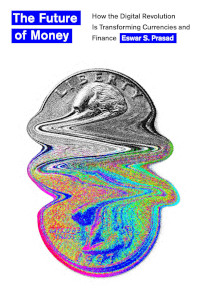Professor shares his thoughts on future of money in lengthy book
Posted by Elena del Valle on July 12, 2023

The Future of Money
Photo: The Belknap Press of Harvard University Press
In The Future of Money How the Digital Revolution Is Transforming Currencies and Finance (The Belknap Press of Harvard University Press, $35) Eswar Prasad outlines the basics of money today and explores what the future might bring. Published in 2021 the 485-page hardcover book is divided into four sections and 10 chapters as well as extensive end notes. There were no replies to email requests for an interview from the publishing company or from Prasad’s email address.
In the book he expresses the belief that Central Bank Digital Currencies (CBDCs) are likely to be a part of our future; and that the use of digital payments in lieu of cash will displace privacy in commercial transactions. He says that despite the loss of privacy they bring financial technologies have the potential to improve the economic conditions for many, especially the poor and economically marginalized.
He describes two main types of CBDCs, wholesale and retail. Wholesale refers to transactions between the central bank and banks and financial payment companies. Retail refers to individuals and businesses. Within retail there are three categories, according to the author: e-money such as the digital money payment services like PayPal and Venmo offer as well as that offered by pioneering central banks like the Riksbank in Sweden; a second option, more technologically sophisticated, is an account based CBDC through which individuals and businesses would have accounts directly at the central banks; and an officially sanctioned cryptocurrency, a form of digital currency designed to operate on “permissioned blockchains.”
Cryptocurrencies instead of bypassing governments and affording users some anonymity may have the opposite effect at the expense of individual liberties, he speculates. In the final chapter he explains that such changes won’t solve all problems; corruption, lax government, the advantages of the elites and inequality will continue to plague society.
According to his book jacket bio at the time the book was published Prasad was the Tolani senior professor of Trade Policy and professor of economics at Cornell University; he was a senior fellow at the Brookings Institution, where he held the New Century Chair in International Economics; and a research associate at the National Bureau of Economic Research. His other titles include Gaining Currency: The Rise of Renminbi and The Dollar Trap: How the U.S. Dollar Tightened its Grip on Global Finance.









